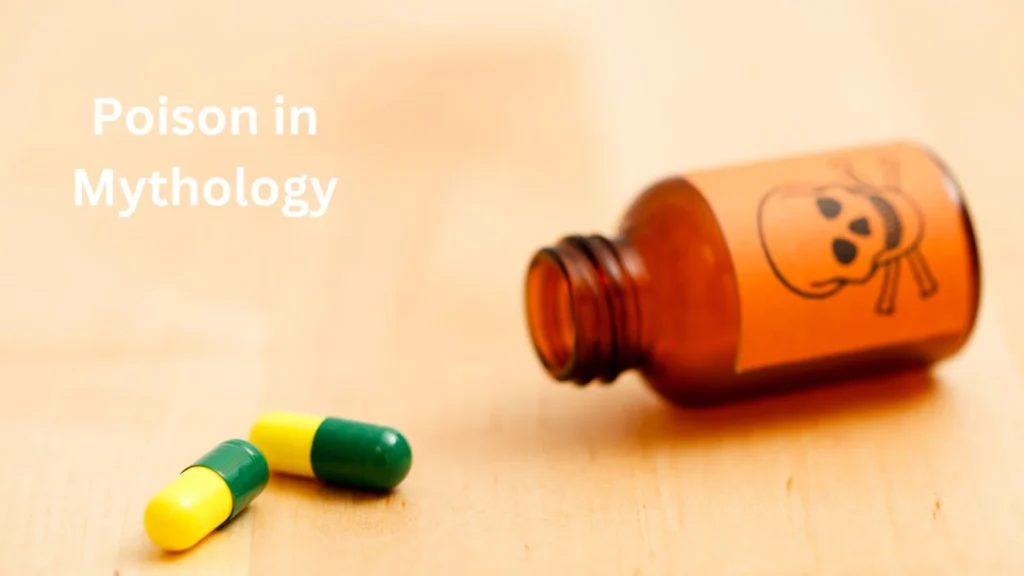Last updated on November 17th, 2024 at 06:46 am
Names that carry meanings associated with poison often evoke a sense of danger, mystery, or the natural world. In mythology, folklore, and even modern times, the concept of poison has been connected with both harm and healing, as poisons were also used in medicinal remedies.
In this article, we explore various names from different cultures that carry meanings related to poison, toxins, venom, and their symbolic interpretations.
Whether you’re seeking an edgy, dark name with a powerful undertone, or simply exploring unique meanings, this list offers a selection of captivating names with intriguing associations.
Girls Names That Mean Poison

- Belladonna
- Name and Meaning: “Beautiful lady” in Italian, also refers to a toxic plant used historically in cosmetics.
- Name Origin: Italian.
- Popularity: Rare and poetic.
- Gender Specification: Female.
- Associated Meanings with Example: Symbolizes deadly beauty, often used in gothic or fantasy settings.
- Hemlock
- Name and Meaning: Named after a poisonous plant, linked to danger and mystery.
- Name Origin: English.
- Popularity: Extremely rare, seen more in fiction.
- Gender Specification: Female.
- Associated Meanings with Example: Represents philosophical sacrifice, as in Socrates’ story.
- Cyanide
- Name and Meaning: Associated with a potent poison; the name evokes intensity and intrigue.
- Name Origin: Greek.
- Popularity: Virtually unheard of in real life, common in fictional works.
- Gender Specification: Female.
- Associated Meanings with Example: Reflects cunning and calculated precision, as seen in espionage stories.
- Nightshade
- Name and Meaning: Refers to the nightshade family of plants, many of which are toxic.
- Name Origin: Old English.
- Popularity: Rare and often symbolic.
- Gender Specification: Female.
- Associated Meanings with Example: Represents shadowy allure, seen in gothic tales.
- Ivy
- Name and Meaning: A climbing plant, some species of which are mildly toxic.
- Name Origin: English.
- Popularity: Moderately popular as a feminine name.
- Gender Specification: Female.
- Associated Meanings with Example: Associated with resilience and charm, as in Batman’s Poison Ivy.
- Asena
- Name and Meaning: Means “she-wolf” in Turkish mythology; linked to protective poison.
- Name Origin: Turkish.
- Popularity: Uncommon, mostly in Turkey and surrounding regions.
- Gender Specification: Female.
- Associated Meanings with Example: Represents a fierce guardian, similar to a wolf’s cunning nature.
- Absinthe
- Name and Meaning: Refers to the green, often toxic liquor.
- Name Origin: French/Greek.
- Popularity: Extremely rare.
- Gender Specification: Female.
- Associated Meanings with Example: Symbolizes forbidden indulgence, as in literary references to the “green fairy.”
- Oleander
- Name and Meaning: A toxic flowering plant, symbolizing beauty with a hidden edge.
- Name Origin: Greek.
- Popularity: Rare, with a soft, feminine allure.
- Gender Specification: Female.
- Associated Meanings with Example: Represents deceptive beauty, often seen in Mediterranean folklore.
- Tansy
- Name and Meaning: Derived from the flowering plant, some parts of which are toxic.
- Name Origin: Greek/Old English.
- Popularity: Uncommon but charming.
- Gender Specification: Female.
- Associated Meanings with Example: Historically used as a symbol of immortality, despite its poisonous nature.
- Delphinium
- Name and Meaning: Named after the striking but toxic flower.
- Name Origin: Latin.
- Popularity: Rare, botanical in style.
- Gender Specification: Female.
- Associated Meanings with Example: Reflects delicate beauty, as seen in floral-inspired poetry.
- Briar
- Name and Meaning: Refers to a thorny plant, with an air of danger and enchantment.
- Name Origin: Old English.
- Popularity: Moderately popular.
- Gender Specification: Female.
- Associated Meanings with Example: Associated with fairy tales, such as Sleeping Beauty’s Briar Rose.
- Amaya
- Name and Meaning: Means “night rain,” indirectly linked to dark, poisonous imagery.
- Name Origin: Japanese/Spanish.
- Popularity: Growing in popularity globally.
- Gender Specification: Female.
- Associated Meanings with Example: Symbolizes melancholy beauty, often used in contemporary works.
- Poppy
- Name and Meaning: Symbolizes remembrance and can be linked to the opium poppy.
- Name Origin: Latin.
- Popularity: Popular in English-speaking countries.
- Gender Specification: Female.
- Associated Meanings with Example: Represents both life and danger, seen in WWI memorials.
- Lorelai
- Name and Meaning: A siren from German legend, associated with enchantment and danger.
- Name Origin: German.
- Popularity: Rare but gaining attention.
- Gender Specification: Female.
- Associated Meanings with Example: Symbolizes alluring mystery, famously referenced in Rhine River legends.
- Veronica
- Name and Meaning: Means “she who brings victory,” but linked to toxic medicinal uses.
- Name Origin: Latin.
- Popularity: Fairly common.
- Gender Specification: Female.
- Associated Meanings with Example: Often linked to healing and poison in historical contexts.
Boys Names That Mean Poison

- Aconite
- Name and Meaning: Derived from the toxic flower, often symbolizing danger and power.
- Name Origin: Greek.
- Popularity: Rare, often used in mythology or literature.
- Gender Specification: Male.
- Associated Meanings with Example: Represents a potent weapon in ancient legends, used to deter enemies.
- Arsen
- Name and Meaning: Meaning “virile,” with a phonetic resemblance to arsenic.
- Name Origin: Greek/Slavic.
- Popularity: Moderately popular in Eastern Europe.
- Gender Specification: Male.
- Associated Meanings with Example: Represents strength and subtle danger, making it a popular choice for strong, mysterious characters.
- Draven
- Name and Meaning: A shadowy name tied to themes of danger and enigma.
- Name Origin: English.
- Popularity: Moderately popular in gothic and fantasy genres.
- Gender Specification: Male.
- Associated Meanings with Example: Seen as an antihero name, notably in The Crow.
- Venin
- Name and Meaning: French for “poison,” denoting subtlety and power.
- Name Origin: French.
- Popularity: Extremely rare.
- Gender Specification: Male.
- Associated Meanings with Example: Suggests stealth and control, often used for enigmatic figures in literature.
- Toxic
- Name and Meaning: Refers to something harmful or poisonous.
- Name Origin: Latin-derived English.
- Popularity: Rare and unconventional.
- Gender Specification: Male.
- Associated Meanings with Example: Represents danger and allure, often used in edgy or symbolic contexts.
- Belladonnus
- Name and Meaning: A masculine adaptation of Belladonna, symbolizing deadly beauty.
- Name Origin: Italian.
- Popularity: Extremely rare, used mostly in fiction.
- Gender Specification: Male.
- Associated Meanings with Example: Evokes a dark charm, as in gothic literature.
- Cobra
- Name and Meaning: Refers to the venomous snake, symbolizing lethal grace.
- Name Origin: Sanskrit/Portuguese.
- Popularity: Rare, but gaining traction as a bold name.
- Gender Specification: Male.
- Associated Meanings with Example: Seen in martial arts and espionage themes, reflecting stealth and danger.
- Stryker
- Name and Meaning: Symbolizes a powerful strike, linked to venomous impact.
- Name Origin: Dutch/English.
- Popularity: Rising in popularity as a bold, modern choice.
- Gender Specification: Male.
- Associated Meanings with Example: Often linked with decisive and impactful characters in action genres.
- Talon
- Name and Meaning: Refers to a claw, with an indirect connection to poison and predatory power.
- Name Origin: Old French/Latin.
- Popularity: Gaining traction as a strong, nature-inspired name.
- Gender Specification: Male.
- Associated Meanings with Example: Symbolizes stealth and strength, akin to a predator’s strike.
- Foxglove
- Name and Meaning: Named after a toxic plant, known for its beautiful but deadly flowers.
- Name Origin: Old English.
- Popularity: Extremely rare and literary.
- Gender Specification: Male.
- Associated Meanings with Example: Represents deceptive beauty, often used in fantasy settings.
- Hemlock
- Name and Meaning: A plant with historical ties to lethal poison.
- Name Origin: English/Greek.
- Popularity: Rare and poetic.
- Gender Specification: Male.
- Associated Meanings with Example: Associated with profound sacrifice and philosophical resilience.
- Onyx
- Name and Meaning: Refers to the dark gemstone, symbolizing poison’s elegance.
- Name Origin: Greek/Latin.
- Popularity: Moderately popular for its edgy vibe.
- Gender Specification: Male.
- Associated Meanings with Example: Linked to darkness and resilience, often seen in fantasy stories.
- Krait
- Name and Meaning: A venomous snake species, symbolizing lethal precision.
- Name Origin: Hindi.
- Popularity: Rare and exotic.
- Gender Specification: Male.
- Associated Meanings with Example: Represents danger and agility, often found in wilderness themes.
- Aether
- Name and Meaning: The upper air or spirit, linked to myths of poisonous ethereal elements.
- Name Origin: Greek.
- Popularity: Rare and mysterious.
- Gender Specification: Male.
- Associated Meanings with Example: Evokes a supernatural aura, often seen in ancient mythology.
- Fang
- Name and Meaning: Refers to sharp teeth, often associated with venomous bites.
- Name Origin: Chinese/English.
- Popularity: Uncommon but striking.
- Gender Specification: Male.
- Associated Meanings with Example: Suggests aggression and mystery, seen in stories of predators.
Japanese Names That Mean Poison

- Dokuga (毒蛾)
- Name and Meaning: Means “poison moth,” symbolizing subtle danger and transformation.
- Name Origin: Japanese.
- Popularity: Rare and used in fantasy or poetic settings.
- Gender Specification: Unisex.
- Associated Meanings with Example: Represents a delicate but lethal beauty, much like moths in folklore.
- Shikyo (死境)
- Name and Meaning: Translates to “death boundary,” referring to the perilous edge of life.
- Name Origin: Japanese.
- Popularity: Very rare and dramatic.
- Gender Specification: Male.
- Associated Meanings with Example: Evokes a sense of mystery and danger in warrior or mythological tales.
- Tsurugi (剣毒)
- Name and Meaning: Means “poisoned blade,” blending strength and lethal cunning.
- Name Origin: Japanese.
- Popularity: Moderately popular in historical or fantasy contexts.
- Gender Specification: Male.
- Associated Meanings with Example: Often symbolizes warriors or assassins in samurai legends.
- Hibana (火花)
- Name and Meaning: While it means “spark,” it can symbolize the spark of poison spreading quickly.
- Name Origin: Japanese.
- Popularity: Common for its versatility but rarely tied to poison explicitly.
- Gender Specification: Female.
- Associated Meanings with Example: Represents a deceptive beauty that can become dangerous when provoked.
- Enrai (怨雷)
- Name and Meaning: Means “vengeful thunder,” symbolizing sudden and powerful poison-like vengeance.
- Name Origin: Japanese.
- Popularity: Rare, seen in poetic or martial tales.
- Gender Specification: Male.
- Associated Meanings with Example: Suggests hidden danger and revenge, akin to a storm’s surprise.
- Dokuro (毒露)
- Name and Meaning: Translates to “poison dew,” reflecting a subtle and beautiful danger.
- Name Origin: Japanese.
- Popularity: Extremely rare, often in folklore.
- Gender Specification: Male.
- Associated Meanings with Example: Represents nature’s beauty and peril, often featured in tragic stories.
- Kuroha (黒葉)
- Name and Meaning: Means “black leaf,” with an association to plants and poisons.
- Name Origin: Japanese.
- Popularity: Rare but poetic.
- Gender Specification: Female.
- Associated Meanings with Example: Evokes the image of beautiful but toxic foliage in enchanted forests.
- Satsuki (皐月毒)
- Name and Meaning: Traditional name for May but linked here to toxic spring plants.
- Name Origin: Japanese.
- Popularity: Common as a first name, with subtle ties to poison in creative contexts.
- Gender Specification: Female.
- Associated Meanings with Example: Represents renewal with hidden danger, like blooming yet deadly flowers.
- Yami (闇毒)
- Name and Meaning: Translates to “dark poison,” emphasizing stealth and lethality.
- Name Origin: Japanese.
- Popularity: Rare and often used in anime or fantasy.
- Gender Specification: Unisex.
- Associated Meanings with Example: Embodies a quiet, shadowy danger, seen in ninja lore.
- Mamushi (蝮)
- Name and Meaning: Refers to a venomous pit viper in Japan, symbolizing lethal stealth.
- Name Origin: Japanese.
- Popularity: Rare as a name but culturally significant.
- Gender Specification: Male.
- Associated Meanings with Example: Represents nature’s precision, often used metaphorically in cautionary tales.
- Kagekiyo (景清毒)
- Name and Meaning: Combines “shadow” and “poison,” symbolizing hidden power.
- Name Origin: Japanese.
- Popularity: Rare and historical.
- Gender Specification: Male.
- Associated Meanings with Example: Reflects silent yet potent danger, often tied to samurai lore.
- Fujiko (藤子毒)
- Name and Meaning: Derives from “wisteria,” a plant associated with both beauty and toxicity.
- Name Origin: Japanese.
- Popularity: Moderately popular for its floral connotations.
- Gender Specification: Female.
- Associated Meanings with Example: Represents elegance and mystery, featured in nature-based stories.
- Rikona (利毒名)
- Name and Meaning: Combines “clever” with “poison,” indicating a strategic edge.
- Name Origin: Japanese.
- Popularity: Very rare.
- Gender Specification: Unisex.
- Associated Meanings with Example: Represents intellect and danger, often in espionage themes.
- Dokuno (毒野)
- Name and Meaning: Means “poison field,” symbolizing widespread danger.
- Name Origin: Japanese.
- Popularity: Rare and symbolic.
- Gender Specification: Male.
- Associated Meanings with Example: Reflects hidden peril in serene environments, popular in fantasy literature.
- Kaizen (改毒善)
- Name and Meaning: A twist on “improvement” with “poison,” symbolizing transformation through adversity.
- Name Origin: Japanese.
- Popularity: Uncommon but gaining appeal.
- Gender Specification: Male.
- Associated Meanings with Example: Represents change through danger, used in motivational tales.
- Jorogumo (絡新婦)
- Name and Meaning: Refers to a mythical spider demon, often tied to poisonous deception.
- Name Origin: Japanese.
- Popularity: Rare, largely mythical.
- Gender Specification: Female.
- Associated Meanings with Example: Represents alluring danger, featured in Japanese folklore.
- Shinen (深淵毒)
- Name and Meaning: Means “abyss poison,” evoking a deep and mysterious peril.
- Name Origin: Japanese.
- Popularity: Extremely rare.
- Gender Specification: Male.
- Associated Meanings with Example: Suggests uncharted dangers, often in gothic or horror genres.
- Utsuro (虚毒)
- Name and Meaning: Translates to “void poison,” symbolizing emptiness and toxicity.
- Name Origin: Japanese.
- Popularity: Rare and poetic.
- Gender Specification: Unisex.
- Associated Meanings with Example: Reflects despair and danger in philosophical tales.
- Kurai (暗毒)
- Name and Meaning: Means “dark poison,” indicating subtle yet potent harm.
- Name Origin: Japanese.
- Popularity: Rare and mystical.
- Gender Specification: Unisex.
- Associated Meanings with Example: Evokes a hidden power, seen in tales of revenge.
- Tsukiyo (月夜毒)
- Name and Meaning: “Moonlit night poison,” representing nocturnal danger.
- Name Origin: Japanese.
- Popularity: Rare and poetic.
- Gender Specification: Female.
- Associated Meanings with Example: Suggests beauty under moonlight, with a hidden toxic edge.
Names Meaning “Poison” in Mythology

- Aconite
- Meaning: Poisonous plant (also known as wolfsbane)
- Name Origin: Greek
- Popularity: Rare
- Associated Meanings: A deadly poison, often used in ancient lore to represent danger.
- Hemlock
- Meaning: Poisonous plant
- Name Origin: English
- Popularity: Rare
- Associated Meanings: Historically used as a poison, including in the execution of Socrates.
- Circe
- Meaning: Enchantress who used poisons
- Name Origin: Greek
- Popularity: Rare
- Associated Meanings: A mythological sorceress known for her use of potions and poisons.
- Belladonna
- Meaning: Beautiful lady; poisonous plant
- Name Origin: Italian
- Popularity: Rare
- Associated Meanings: The plant’s toxic nature is hidden behind its name’s beauty.
- Achlys
- Meaning: Mist of death; poison
- Name Origin: Greek
- Popularity: Rare
- Associated Meanings: Goddess of death mist, connected to poisonous vapors.
- Vipera
- Meaning: Venomous snake
- Name Origin: Latin
- Popularity: Rare
- Associated Meanings: Represents the danger and lethality of poisonous snakes.
- Naja
- Meaning: Cobra
- Name Origin: Sanskrit
- Popularity: Rare
- Associated Meanings: The venomous snake species, symbolizing potency and danger.
- Lilith
- Meaning: Night creature; poison (symbolically)
- Name Origin: Hebrew
- Popularity: Popular
- Associated Meanings: A mythical figure often associated with darkness and danger.
- Asphodel
- Meaning: Flower of the dead; poisonous flower
- Name Origin: Greek
- Popularity: Rare
- Associated Meanings: A flower connected with death and underworld mythology.
- Tisiphone
- Meaning: Avenger; poisonous vengeance
- Name Origin: Greek
- Popularity: Rare
- Associated Meanings: One of the Furies, associated with punishment and vengeance through poison.
Names Meaning “Poisonous Plants”
- Oleander
- Meaning: Poisonous flowering shrub
- Name Origin: Latin
- Popularity: Rare
- Associated Meanings: A beautiful yet toxic plant.
- Ivy
- Meaning: Poisonous plant
- Name Origin: English
- Popularity: Popular
- Associated Meanings: While associated with growth, poison ivy represents danger in nature.
- Toxicodendron
- Meaning: Poison tree
- Name Origin: Greek
- Popularity: Extremely rare
- Associated Meanings: The scientific name for poison ivy, poison oak, and poison sumac.
- Caladium
- Meaning: Poisonous plant
- Name Origin: Latin
- Popularity: Rare
- Associated Meanings: Known for its toxic leaves, symbolizing beauty with a hidden danger.
- Daphne
- Meaning: Laurel; poisonous shrub
- Name Origin: Greek
- Popularity: Popular
- Associated Meanings: A beautiful but toxic plant, used symbolically in myth.
- Foxglove
- Meaning: Poisonous flowering plant
- Name Origin: English
- Popularity: Rare
- Associated Meanings: Contains a potent poison used medicinally, representing duality.
- Yew
- Meaning: Poisonous tree
- Name Origin: English
- Popularity: Rare
- Associated Meanings: A tree associated with death and poison.
- Wisteria
- Meaning: Poisonous flowering plant
- Name Origin: Greek
- Popularity: Rare
- Associated Meanings: Known for its beauty and toxicity.
- Hydrangea
- Meaning: Poisonous plant
- Name Origin: Greek
- Popularity: Rare
- Associated Meanings: Despite its beauty, parts of the plant are toxic.
- Larkspur
- Meaning: Poisonous flowering plant
- Name Origin: English
- Popularity: Rare
- Associated Meanings: Associated with poison and danger.
Names Meaning “Venom”
- Venena
- Meaning: Poison
- Name Origin: Latin
- Popularity: Rare
- Associated Meanings: A literal term for poison or venom.
- Venom
- Meaning: Toxic substance produced by animals
- Name Origin: Latin
- Popularity: Rare
- Associated Meanings: Symbolizes danger and potency.
- Toxica
- Meaning: Poisonous
- Name Origin: Latin
- Popularity: Rare
- Associated Meanings: Refers to toxins, often used in fantasy contexts.
- Serpenta
- Meaning: Snake; venom
- Name Origin: Latin
- Popularity: Rare
- Associated Meanings: Evokes imagery of venomous snakes.
- Fang
- Meaning: Venomous bite
- Name Origin: Chinese
- Popularity: Rare
- Associated Meanings: Represents the lethal bite of venomous creatures.
- Viper
- Meaning: Venomous snake
- Name Origin: Latin
- Popularity: Rare
- Associated Meanings: Symbolizes danger and stealth.
- Krait
- Meaning: Venomous snake
- Name Origin: Hindi
- Popularity: Rare
- Associated Meanings: Represents a specific venomous snake species known for its toxicity.
- Adder
- Meaning: Venomous snake
- Name Origin: Old English
- Popularity: Rare
- Associated Meanings: Known for its dangerous bite.
- Taipan
- Meaning: Highly venomous snake
- Name Origin: Aboriginal Australian
- Popularity: Rare
- Associated Meanings: Represents one of the most venomous snakes in the world.
- Asp
- Meaning: Venomous snake
- Name Origin: Greek
- Popularity: Rare
- Associated Meanings: The snake associated with Cleopatra, symbolizing lethal power.
Names Meaning “Toxins”

- Toxon
- Meaning: Poison
- Name Origin: Greek
- Popularity: Rare
- Associated Meanings: The origin of the word “toxin.”
- Striga
- Meaning: Poisonous witch
- Name Origin: Latin
- Popularity: Rare
- Associated Meanings: Often used in folklore for dangerous witches who used poisons.
- Curare
- Meaning: Poison used on arrows
- Name Origin: Native American
- Popularity: Rare
- Associated Meanings: A deadly poison used in hunting and warfare.
- Ricina
- Meaning: Poison (from ricin)
- Name Origin: Latin
- Popularity: Rare
- Associated Meanings: Refers to ricin, a powerful and dangerous toxin.
- Cobra
- Meaning: Venomous snake
- Name Origin: Portuguese
- Popularity: Popular
- Associated Meanings: Represents lethality and stealth.
- Cicuta
- Meaning: Poisonous hemlock plant
- Name Origin: Latin
- Popularity: Rare
- Associated Meanings: Known for its deadly poison, used historically in executions.
- Scorpion
- Meaning: Poisonous creature
- Name Origin: Latin
- Popularity: Rare
- Associated Meanings: Represents venom and danger.
- Tarantula
- Meaning: Poisonous spider
- Name Origin: Italian
- Popularity: Rare
- Associated Meanings: Associated with venom and aggression.
- Bellona
- Meaning: Goddess of war; poison (symbolically)
- Name Origin: Latin
- Popularity: Rare
- Associated Meanings: Goddess associated with war and destruction.
- Verina
- Meaning: Poison
- Name Origin: Latin
- Popularity: Rare
- Associated Meanings: A name associated with toxic substances.
Names Meaning “Venomous Creatures”
- Vipera
- Meaning: Venomous snake
- Name Origin: Latin
- Popularity: Rare
- Associated Meanings: Represents a dangerous and venomous creature, often associated with stealth and lethality.
- Atheris
- Meaning: Venomous viper
- Name Origin: Greek
- Popularity: Rare
- Associated Meanings: Represents a viper known for its venom, symbolizing danger.
- Serket
- Meaning: Scorpion goddess
- Name Origin: Egyptian
- Popularity: Rare
- Associated Meanings: An ancient Egyptian goddess associated with scorpions and poison.
- Ophion
- Meaning: Snake
- Name Origin: Greek
- Popularity: Rare
- Associated Meanings: Refers to a primordial serpent in Greek mythology, representing the natural power of venom.
- Natrix
- Meaning: Water snake
- Name Origin: Latin
- Popularity: Rare
- Associated Meanings: Refers to a venomous snake found in water, symbolizing fluidity and danger.
- Mamba
- Meaning: Venomous snake
- Name Origin: Swahili
- Popularity: Rare
- Associated Meanings: Represents one of the deadliest snakes in the world, symbolizing swiftness and lethality.
- Nagini
- Meaning: Female snake
- Name Origin: Sanskrit
- Popularity: Rare
- Associated Meanings: Represents a venomous female serpent, often associated with power and danger.
- Crotalus
- Meaning: Rattlesnake
- Name Origin: Greek
- Popularity: Rare
- Associated Meanings: Represents the deadly rattlesnake, symbolizing caution and threat.
- Aranea
- Meaning: Spider
- Name Origin: Latin
- Popularity: Rare
- Associated Meanings: Refers to venomous spiders, representing deadly precision and patience.
- Scorpio
- Meaning: Scorpion
- Name Origin: Latin
- Popularity: Popular
- Associated Meanings: Known for its poisonous sting, Scorpio is often associated with mystery and danger.
Names Meaning “Dangerous Potions”
- Elixir
- Meaning: Magical or medicinal potion
- Name Origin: Arabic
- Popularity: Rare
- Associated Meanings: Represents both healing and danger, depending on its use.
- Potion
- Meaning: A liquid with magical properties, often poisonous
- Name Origin: Latin
- Popularity: Rare
- Associated Meanings: Refers to mixtures that can either cure or harm, symbolizing mystery.
- Mandrake
- Meaning: Poisonous plant used in magic
- Name Origin: English
- Popularity: Rare
- Associated Meanings: Known for its toxic root, mandrake has been a staple in mystical practices.
- Bane
- Meaning: Poison; something that causes death
- Name Origin: Old English
- Popularity: Rare
- Associated Meanings: Represents death and destruction, often connected to poison in literature.
- Nux
- Meaning: Nut (poisonous seeds)
- Name Origin: Latin
- Popularity: Rare
- Associated Meanings: Refers to the seeds of poisonous plants, representing hidden dangers.
- Stramonium
- Meaning: Poisonous plant (also known as jimsonweed)
- Name Origin: Latin
- Popularity: Rare
- Associated Meanings: Known for its toxic effects, used in both magic and medicine.
- Tinctura
- Meaning: Liquid extract (can be poisonous)
- Name Origin: Latin
- Popularity: Rare
- Associated Meanings: Refers to concentrated liquids, sometimes containing poisonous substances.
- Absinthe
- Meaning: Bitter, toxic plant used in alcoholic drinks
- Name Origin: French
- Popularity: Rare
- Associated Meanings: Known for its toxic and hallucinogenic effects in certain forms.
- Curara
- Meaning: Poison used on arrows
- Name Origin: Indigenous American
- Popularity: Rare
- Associated Meanings: Represents a lethal poison used in hunting.
- Hyoscyamus
- Meaning: Poisonous plant (also known as henbane)
- Name Origin: Greek
- Popularity: Rare
- Associated Meanings: Known for its use in ancient poisons, symbolizing danger and death.
Names Meaning “Deadly Substances”

- Strychnine
- Meaning: Poisonous chemical compound
- Name Origin: Latin
- Popularity: Rare
- Associated Meanings: Known for its deadly effect, used in literature and real life.
- Toxon
- Meaning: Poison
- Name Origin: Greek
- Popularity: Rare
- Associated Meanings: Refers to deadly substances, particularly toxins.
- Curara
- Meaning: Poison
- Name Origin: Native American
- Popularity: Rare
- Associated Meanings: A dangerous poison historically used on arrows for hunting.
- Aconita
- Meaning: Poisonous plant
- Name Origin: Greek
- Popularity: Rare
- Associated Meanings: Also known as wolfsbane, aconite is deadly in small doses.
- Mercurial
- Meaning: Poisonous chemical; changeable
- Name Origin: Latin
- Popularity: Rare
- Associated Meanings: Refers to the toxic element mercury and its symbolic volatility.
- Tetrodotoxin
- Meaning: Poison found in pufferfish
- Name Origin: Greek
- Popularity: Rare
- Associated Meanings: One of the most deadly toxins, known for its swift, lethal effects.
- Atropine
- Meaning: Poisonous chemical derived from deadly nightshade
- Name Origin: Greek
- Popularity: Rare
- Associated Meanings: Known for its use in medicine, but lethal in larger doses.
- Bellona
- Meaning: Goddess of war; poison (symbolically)
- Name Origin: Latin
- Popularity: Rare
- Associated Meanings: Represents destruction, often involving poison.
- Hydra
- Meaning: Water; venomous serpent (symbolically)
- Name Origin: Greek
- Popularity: Rare
- Associated Meanings: Known for its deadly bite and regenerative abilities, often linked to poison.
- Cyanide
- Meaning: Deadly chemical
- Name Origin: Greek
- Popularity: Rare
- Associated Meanings: A notorious poison used in both warfare and crime, symbolizing immediate danger.
Names Meaning “Toxic Flowers”
- Oleander
- Meaning: Poisonous flowering shrub
- Name Origin: Latin
- Popularity: Rare
- Associated Meanings: Represents beauty with hidden danger, as all parts of the oleander plant are toxic.
- Foxglove
- Meaning: Poisonous flowering plant
- Name Origin: English
- Popularity: Rare
- Associated Meanings: Known for its beautiful flowers and its toxicity, foxglove symbolizes both life and death through its medicinal and poisonous properties.
- Aconite
- Meaning: Poisonous plant (also called monkshood or wolfsbane)
- Name Origin: Greek
- Popularity: Rare
- Associated Meanings: A deadly plant often used in ancient times for poison.
- Datura
- Meaning: Poisonous flowering plant
- Name Origin: Latin
- Popularity: Rare
- Associated Meanings: Also known as “Devil’s Trumpet,” this plant’s toxic effects are well-known in various cultures.
- Hemlock
- Meaning: Poisonous plant
- Name Origin: English
- Popularity: Rare
- Associated Meanings: Hemlock is notorious for its deadly properties and its use in the execution of Socrates.
- Nightshade
- Meaning: Poisonous plant
- Name Origin: English
- Popularity: Rare
- Associated Meanings: Known for its toxic berries and association with witchcraft and magic.
- Lily of the Valley
- Meaning: Poisonous flower
- Name Origin: English
- Popularity: Popular
- Associated Meanings: Beautiful but deadly, the entire plant is toxic, making it symbolic of concealed danger.
- Nerium
- Meaning: Poisonous flower (another name for oleander)
- Name Origin: Greek
- Popularity: Rare
- Associated Meanings: Similar to oleander, this flower represents danger wrapped in beauty.
- Laburnum
- Meaning: Poisonous tree with yellow flowers
- Name Origin: Latin
- Popularity: Rare
- Associated Meanings: Known for its bright yellow flowers and its highly toxic seeds, laburnum is often associated with death.
- Delphinium
- Meaning: Poisonous flowering plant
- Name Origin: Greek
- Popularity: Rare
- Associated Meanings: A striking plant with tall spires of flowers, delphinium’s toxic nature is masked by its beauty.
Names Meaning “Dangerous Animals”
- Viper
- Meaning: Venomous snake
- Name Origin: Latin
- Popularity: Rare
- Associated Meanings: Represents lethality and stealth, as the viper is known for its quick, dangerous strikes.
- Cobra
- Meaning: Venomous snake
- Name Origin: Portuguese
- Popularity: Popular
- Associated Meanings: Symbolizes danger and power, as cobras are feared for their venomous bites.
- Asp
- Meaning: Venomous snake
- Name Origin: Greek
- Popularity: Rare
- Associated Meanings: Historically linked to Cleopatra, the asp represents fatality and the swift power of poison.
- Scorpio
- Meaning: Scorpion
- Name Origin: Latin
- Popularity: Popular
- Associated Meanings: Known for its poisonous sting, scorpio is symbolic of mystery and hidden danger.
- Black Widow
- Meaning: Poisonous spider
- Name Origin: English
- Popularity: Rare
- Associated Meanings: Represents lethality, as black widow spiders are known for their venomous bites and symbolic power.
- Mamba
- Meaning: Deadly snake
- Name Origin: Swahili
- Popularity: Rare
- Associated Meanings: Known as one of the most venomous snakes, the mamba symbolizes speed, danger, and death.
- Krait
- Meaning: Venomous snake
- Name Origin: Hindi
- Popularity: Rare
- Associated Meanings: The krait is a symbol of quiet lethality, known for its deadly venom.
- Tarantula
- Meaning: Large, hairy spider
- Name Origin: Italian
- Popularity: Rare
- Associated Meanings: Known for its size and venom, the tarantula symbolizes danger lurking beneath the surface.
- Pufferfish
- Meaning: Fish with a highly toxic substance (tetrodotoxin)
- Name Origin: English
- Popularity: Rare
- Associated Meanings: Although seemingly harmless, the pufferfish contains one of the most dangerous toxins in the animal kingdom.
- Komodo
- Meaning: Venomous lizard
- Name Origin: Indonesian
- Popularity: Rare
- Associated Meanings: Represents raw power and danger, as the Komodo dragon is known for its toxic bite.
Names Meaning “Toxic Elements”
- Arsenic
- Meaning: Poisonous chemical
- Name Origin: Greek
- Popularity: Rare
- Associated Meanings: Historically used in assassinations, arsenic is a potent symbol of death and danger.
- Cyanide
- Meaning: Deadly poison
- Name Origin: Greek
- Popularity: Rare
- Associated Meanings: Known for its swift lethality, cyanide symbolizes hidden danger and instant death.
- Mercury
- Meaning: Poisonous metal
- Name Origin: Latin
- Popularity: Rare
- Associated Meanings: While essential in small amounts, mercury’s toxic nature makes it a symbol of volatility and danger.
- Thallium
- Meaning: Poisonous metal
- Name Origin: Greek
- Popularity: Rare
- Associated Meanings: A highly toxic substance used in crimes, thallium represents concealed danger.
- Lead
- Meaning: Heavy metal, toxic in large amounts
- Name Origin: English
- Popularity: Rare
- Associated Meanings: Lead poisoning is symbolic of slow, hidden danger.
- Radon
- Meaning: Radioactive gas
- Name Origin: Latin
- Popularity: Rare
- Associated Meanings: Known for its toxic and radioactive properties, radon is symbolic of silent, invisible danger.
- Polonium
- Meaning: Highly radioactive and toxic element
- Name Origin: Greek
- Popularity: Rare
- Associated Meanings: Polonium is infamous for its use in assassinations, representing extreme lethality.
- Plutonium
- Meaning: Radioactive chemical element
- Name Origin: Greek
- Popularity: Rare
- Associated Meanings: Known for its destructive power, plutonium is associated with radiation and toxicity.
- Bromine
- Meaning: Poisonous chemical element
- Name Origin: Greek
- Popularity: Rare
- Associated Meanings: Bromine is symbolic of both industrial use and hidden toxicity.
- Fluorine
- Meaning: Toxic chemical
- Name Origin: Latin
- Popularity: Rare
- Associated Meanings: Although beneficial in small amounts, fluorine’s toxic potential makes it a symbol of duality.
Conclusion:
The names associated with poison evoke a rich blend of danger, mystery, and intrigue, stretching from ancient mythology to modern scientific elements. Whether drawn from the natural world in the form of venomous creatures and toxic plants, or representing deadly chemical compounds, these names carry powerful connotations of both harm and healing. For those seeking unique names with deep, dark meanings, these selections provide an enticing blend of historical significance and enigmatic beauty. Poison, in its various forms, has long been feared and revered — and these names perfectly capture its essence.

Freya Hughes is a name enthusiast with a flair for storytelling. At NamesOrigins.com, she blends her love for language with an understanding of global cultures, creating insightful and intriguing content that uncovers the rich tapestry of name meanings.



